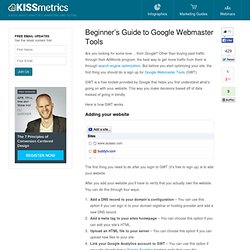

AdWords: Traffic Estimator. Beginner’s Guide to Google Webmaster Tools. Are you looking for some love… from Google?

Other than buying paid traffic through their AdWords program, the best way to get more traffic from them is through search engine optimization. But before you start optimizing your site, the first thing you should do is sign up for Google Webmaster Tools (GWT). GWT is a free toolset provided by Google that helps you first understand what’s going on with your website. This way you make decisions based off of data instead of going in blindly. Here is how GWT works. Adding your website The first thing you need to do after you login to GWT (it’s free to sign up) is to add your website. After you add your website you’ll have to verify that you actually own the website. Dashboard Once your site is verified you’ll start seeing data on your website. The dashboard gives you a rough overview of everything from what keywords you are ranking for to how much traffic you are getting.
Site Configuration Just like everything else, Google isn’t perfect. Sitemaps Labs. [HowTo] Google Calendar API : PHP – Manage events (Part 3) at SANIsoft – PHP for E Biz. Earlier we saw how to install Zend’s GData library and retrieve list of calendars and events.
![[HowTo] Google Calendar API : PHP – Manage events (Part 3) at SANIsoft – PHP for E Biz](http://cdn.pearltrees.com/s/pic/th/google-calendar-sanisoft-7983913)
Now its time to manage events i.e. create, update and delete events. First we need the Calendar service instance, so lets instantiate the Zend_GData_Calendar class. $path = '/home/abbas/ZendGdata/library'; $oldPath = set_include_path(get_include_path() . PATH_SEPARATOR . $path); require_once 'Zend/Loader.php'; Zend_Loader::loadClass('Zend_Gdata'); Zend_Loader::loadClass('Zend_Gdata_ClientLogin'); Zend_Loader::loadClass('Zend_Gdata_Calendar'); // User whose calendars you want to access $user = 'username@gmail.com'; $pass = 'yourpass'; $serviceName = Zend_Gdata_Calendar::AUTH_SERVICE_NAME; // predefined service name for calendar $client = Zend_Gdata_ClientLogin::getHttpClient($user, $pass, $serviceName); $service = new Zend_Gdata_Calendar($client); Creating Single Occurrence Events Lets directly look at the code which has self explanatory comments Creating recurring events Updating an event.
[HowTo] Google Calendar API : PHP – Retrieve events (Part 2) at SANIsoft – PHP for E Biz. In earlier post we saw how to install GData and retrieve a list of calendars.
![[HowTo] Google Calendar API : PHP – Retrieve events (Part 2) at SANIsoft – PHP for E Biz](http://cdn.pearltrees.com/s/pic/th/calendar-retrieve-sanisoft-7983916)
Continuing the same topic lets now see how to retrieve events from Google calendar using GData library. If you haven’t done so, please read the part 1 of this series before continuing. Firstly, lets instantiate the Zend_Gdata_Calendar class. $path = '/home/abbas/ZendGdata/library'; $oldPath = set_include_path(get_include_path() . PATH_SEPARATOR . For retrieving events, specially constructed URLs are used and Zend_Gdata_Calendar_EventQuery makes it easy to construct URL based on the parameters passed to it.
User: If not specified, the “default” (currently authenticated) user is used i.e. default calendar. Retrieve all events Lets get a list of events from default calendar. Retrieve events occuring between a date range Just add these two parameters to the query before getting the event feed // Start date from where to get the events $query->setStartMin('2010-02-01'); // End date $query->setStartMax('2010-03-15'); [HowTo] Google Calendar API : PHP (Part 1) at SANIsoft – PHP for E Biz. Google Calendar is another indispensable tool from mighty Google. As with other Google tools, Calendar too have an API which lets users to manage the events remotely from within their web applications.
Google Calendar API request/response works in the form of Google Data API feeds. The popular PHP client library used to work with Calendar service is Zend’s GData which is also distributed as a part of Zend Framework. In this tutorial we will see how to install GData, authenticate against calendar servers and then access Calendar API to retrieve a list of calendars. Install GData First download the latest release GData library from here. Next step is to make sure you can include ZendGdata/library in your php script. Permanently set the include_path directive in your php.ini configuration file from the command lineSet the include_path path variable on a “per directory” level using .htaccessUse the set_include_path() function to dynamically set the include path in your scripts Authentication.